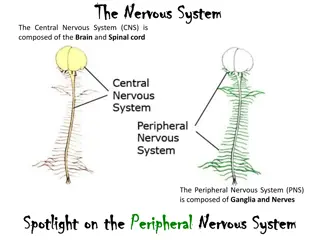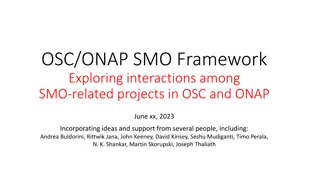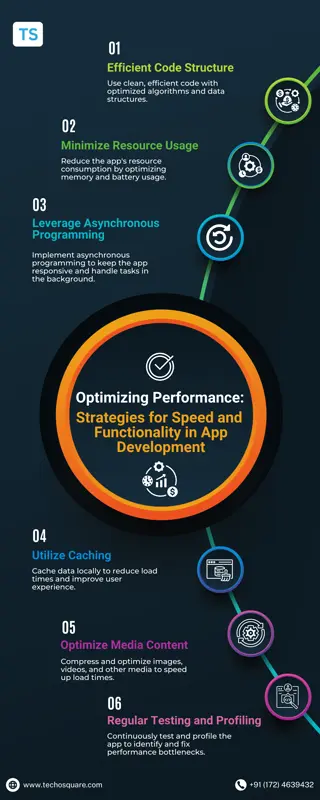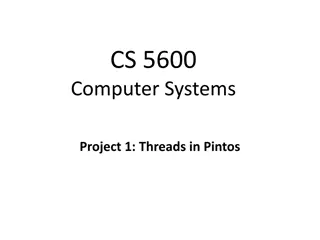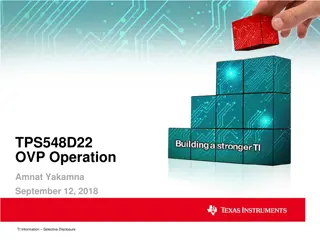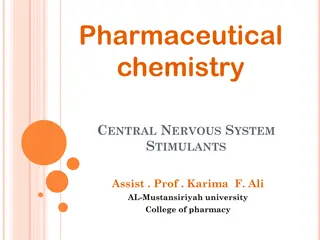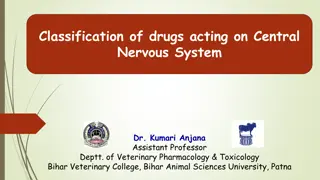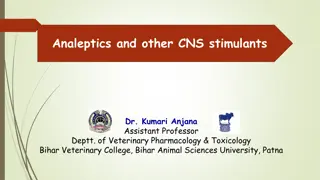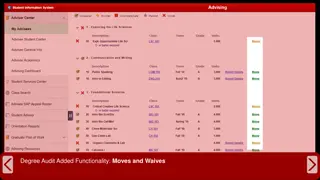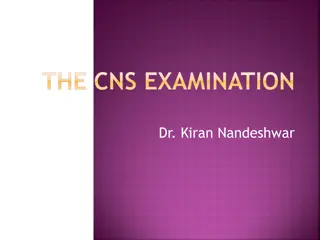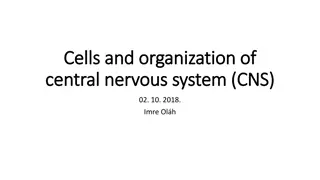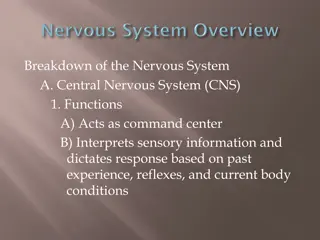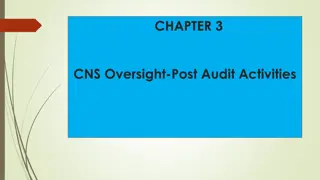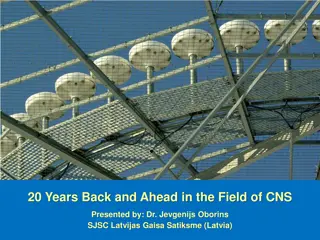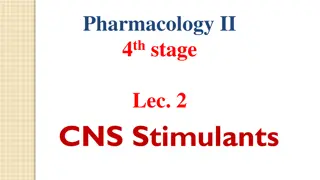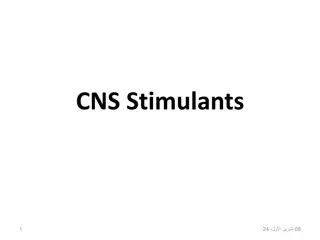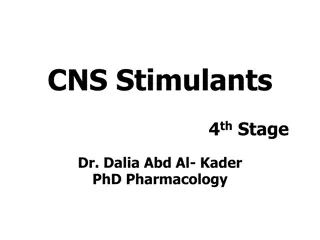FOLIO & Linked Data Functionality Review
Listening to the needs of libraries worldwide, the collaboration between Library of Congress, FOLIO, and EBSCO aims to improve data flow and accessibility through Linked Data aggregation. The initiative includes making BIBFRAME adoption easier, enhancing BIBFRAME editing functionality, and automatin
2 views • 12 slides
Understanding the Nervous System: CNS, PNS, SNS, and ANS
The nervous system comprises the Central Nervous System (CNS) and Peripheral Nervous System (PNS), with the PNS further divided into the Somatic Nervous System (SNS) and Autonomic Nervous System (ANS). The SNS controls voluntary movements of skeletal muscles, while the ANS regulates involuntary proc
2 views • 23 slides
Exploring Interactions Among SMO-related Projects in OSC and ONAP
Coverage of SMO functionality is increasing in OSC projects with strong overlap between OSC and ONAP for SMO-related functionality. Consensus at TOC/TSC level in OSC and ONAP to align with trends in SMO-related discussions in O-RAN Alliance, especially WG1 SMO Decoupled Architecture TR. Efforts to a
5 views • 32 slides
Latest Research Updates on Brain and CNS Cancer Studies
SWAG Network Brain & CNS Cancer Clinical Advisory Group provides research updates on national brain cancer recruitment, national vs. regional recruitment, and ongoing brain cancer studies in the SWAG region. Additionally, insights from the Cancer Patient Experience Survey 2021 shed light on patient
0 views • 10 slides
Optimizing Performance Strategies for Speed and Functionality in App Development
Performance and functionality are significant for the wide acceptance and success of an application in the fast-moving world of app development. Users want an application that is fast responsive, feature-rich, and easy to operate. This article provid
1 views • 1 slides
Optimizing Performance Strategies for Speed and Functionality in App Development
Performance and functionality are significant for the wide acceptance and success of an application in the fast-moving world of app development. Users want an application that is fast responsive, feature-rich, and easy to operate. This article provid
1 views • 11 slides
Understanding Relining and Rebasing Procedures for Dentures
Relining and rebasing are crucial procedures in dentistry to maintain the fit and functionality of dentures. Relining involves resurfacing the tissue side of a denture to improve adaptation, while rebasing replaces the entire denture base material without altering the dental arch or occlusal relatio
1 views • 21 slides
Role of Constitution and Rules in Union Functionality: Speech by T.O. Ogunseye Esq
Constitution plays a crucial role in governing the affairs of a union like ASUP, ensuring rights protection, disciplinary actions, financial accountability, and more. The ASUP Constitution outlines objectives, member rights, disciplinary measures, subscription rules, election guidelines, and educati
0 views • 12 slides
Introduction to Pintos Operating System for Computer Systems Projects
Pintos is a teaching operating system developed by Stanford University, written in C. It provides enough functionality to boot, perform basic device I/O, and includes a small standard library. The goal of using Pintos is to expand its functionality through a series of projects across different direc
2 views • 36 slides
CNS Inspectors Training and Responsibilities in Civil Aviation Safety Oversight
In this chapter, the focus is on the training, qualifications, duties, and responsibilities of CNS inspectors in civil aviation safety oversight. It covers the importance of education and training, ICAO guidance on training, and the role of Civil Aviation Safety Inspectors (CASI) as qualified indivi
0 views • 47 slides
Advanced Operation of TPS548D22 with OVP Functionality
This detailed content presents the operational intricacies of TPS548D22 with OVP function, including setup specifications, fault-triggered actions, shutdown mechanisms, threshold behaviors, and minimum on-time considerations. The process involves orchestrated switching between FETs to regulate VOUT
0 views • 7 slides
Overview of Central Nervous System Stimulants in Pharmaceutical Chemistry
Central Nervous System Stimulants encompass a diverse group of agents with various effects on the CNS, including analeptics, methylxanthines, central sympathomimetic drugs, and antidepressants. Analeptics are potent CNS stimulants with limited use, while methylxanthines like caffeine have widespread
4 views • 41 slides
Classification of Drugs Acting on Central Nervous System
The Central Nervous System (CNS) plays a crucial role in coordinating the body's functions and responses to the environment. Drugs acting on the CNS can be classified into CNS stimulants and CNS depressants. CNS stimulants include spinal, medullary, and cortical stimulants, with various direct and i
0 views • 10 slides
Understanding CNS Stimulants: An Overview
Central Nervous System (CNS) stimulants are drugs that stimulate and improve brain functions. They counteract CNS depression caused by various factors but can have adverse effects if overdosed. Categories include psychostimulants, brain stem stimulants, convulsants, and psychotomimetics. Examples su
4 views • 11 slides
Enhancing Model Functionality for Reporting Selected Results
The new functionality in the model allows for reporting various selected results related to soil loss, runoff, forage demand, and consumption. Different color codes are used to represent different values, making it easy to identify soil condition and erosion status. Additionally, new parameters for
0 views • 7 slides
Global Air Navigation Plan Framework Overview
The International Civil Aviation Organization (ICAO) is developing a revised Global Air Navigation Plan (GANP) to enhance global planning mechanisms. The plan includes strategic documents for regional and national air navigation infrastructure planning, with a focus on CNS/ATM systems and discipline
1 views • 19 slides
Gas Metal Arc Welding (GMAW) Equipment and Functionality Overview
Gas Metal Arc Welding (GMAW) is a versatile welding process that utilizes a consumable electrode wire, electric arc, and shielding gas to join metallic materials efficiently. This method requires essential equipment like power source, consumable electrode wire, wire feeder, welding gun, shielding ga
0 views • 10 slides
Understanding the Nervous System and Sensory Neurons
The nervous system plays a crucial role in connecting the central nervous system (CNS) to limbs and organs through the peripheral nervous system (PNS). It consists of sensory neurons that transmit impulses from sensory receptors to the CNS, allowing us to perceive and respond to various stimuli. The
0 views • 23 slides
Enhancing Degree Audit Process with Moves and Waives Functionality
Empower students to easily request course waivers or reassignments through a user-friendly interface. This added functionality streamlines the degree audit process, allowing for seamless communication with approvers and facilitating quick approvals. Students can make requests, provide comments, and
0 views • 13 slides
Comprehensive CNS Examination Guidelines by Dr. Kiran Nandeshwar
Detailed guidelines for performing a thorough examination of the central nervous system (CNS) covering general examination, higher function assessment, Glasgow Coma Scale, cranial nerves examination, and motor system evaluation. Includes visual aids for each aspect of the examination process.
0 views • 24 slides
Understanding CNS Stimulants and Their Effects on the Nervous System
Exploring the world of central nervous system stimulants, this content delves into the mechanisms of action of stimulant drugs, highlights the neurotransmitters involved, and discusses the signs and symptoms of CNS stimulation. It covers the use of amphetamine in conditions like narcolepsy, attentio
0 views • 65 slides
Understanding the Nervous System: A Comprehensive Overview
The nervous system consists of the central nervous system (CNS) and peripheral nervous system (PNS), with neurons as its basic unit. Neurons function as sensory, associative, and motor types, carrying impulses within the body. Parts of a neuron include the cell body, dendrites, axon, and terminal en
2 views • 86 slides
Overview of the Central Nervous System and Neurotransmitters
The human central nervous system (CNS) is composed of neurons that transmit information through electrical impulses and neurotransmitters at synaptic junctions. Synapses play a crucial role in interneuronal communication, with various types and features impacting information transmission. Neurotrans
0 views • 13 slides
Overview of the Nervous System Components and Functions
The nervous system is comprised of the central nervous system (CNS) and the peripheral nervous system (PNS). The CNS acts as the command center, interpreting sensory information and coordinating responses. The PNS conveys information to and from the CNS through somatic and visceral sensory neurons,
0 views • 48 slides
Enhancing Save and Restore Functionality in CS Studio/Phoebus
CS Studio/Phoebus introduces advanced save and restore capabilities, offering a seamless experience with a modern UI and back-end service implementation. The system allows for efficient data management, integrating with popular database engines for flexible storage solutions. Missing features like c
0 views • 4 slides
Post-Audit Activities in CNS Oversight: Overview and Procedures
The post-audit activities in CNS oversight involve completing administrative details, producing audit reports, evaluating corrective action plans, ensuring full plan implementation, and formal closure of audits. Audit teams conduct meetings, analyze data, validate observations, submit reports, archi
0 views • 29 slides
Advances in ROOT Functionality for ATLAS I/O Team
Discussion on future ROOT functionality/features by Peter van Gemmeren and Marcin Nowak for the ATLAS I/O team, focusing on interface separation, event data streaming, prototype implementations, memory optimization, and new features for ATLAS EDM xAOD in Run 2.
0 views • 13 slides
Conducting Surveillance of CNS Providers
Conducting surveillance of CNS providers involves audits and inspections to ensure compliance with regulatory requirements and maintain safety standards. Various types of audits, such as pre-certification and post-certification audits, are conducted by qualified CNS oversight inspectors to identify
0 views • 48 slides
Understanding Subtyping and Subclasses in Software Design
Subtyping in software design refers to the relationship between types where a subtype can be substituted for its supertype without affecting the correctness of the program. This concept ensures that objects of a subtype meet the specifications of its supertype. Subtypes should not surprise clients b
0 views • 32 slides
Overview of 5G System Architecture and User Plane Functionality
This content showcases various aspects of 5G system architecture, including system handover, non-roaming architecture, service-based architecture, and user plane functionality. It delves into the control plane functions, user plane functions, and core network endpoints of the 5G network. The images
0 views • 49 slides
Clinical Nurse Specialist Institute Fellows Program Overview
The Clinical Nurse Specialist Institute Fellows Program aims to recognize and advance the contributions of clinical nurse specialists in healthcare. Established in 2019, this program honors achievements that promote leadership, impactful work, visibility, full scope practice, data-driven projects, a
0 views • 22 slides
Aviation Seminar: The Evolution of CNS in European ATM Network
Exploring the past and future of Communication, Navigation, and Surveillance (CNS) in Air Traffic Management (ATM), this presentation delves into the critical role of CNS technologies, including airspace management, air traffic flow, and aeronautical information services. It highlights developments
0 views • 13 slides
CNS Involvement in Hemophagocytic Lymphohistiocytosis Syndrome (HLH)
Hemophagocytic Lymphohistiocytosis Syndrome (HLH) is a rare and life-threatening disorder characterized by excessive immune activation. Central Nervous System (CNS) involvement in HLH, although not well standardized in definition, presents a significant cause of morbidity and mortality. Early recogn
0 views • 40 slides
HID Proximity Cards_ Customization Options for Enhanced Functionality
Discover how HID proximity cards offer customizable features for improved security and seamless functionality.
1 views • 6 slides
Understanding CNS Stimulants and Their Mechanisms of Action
CNS stimulants are a type of drug that increase certain chemicals in the brain, enhancing alertness, attention, energy, and physical activity. This article explores psychomotor stimulants like caffeine, nicotine, cocaine, amphetamine, and methylphenidate, discussing their mechanisms of action and ef
0 views • 34 slides
Overview of Narcotic Analgesics and Opioids
Narcotic analgesics, such as opiates and opioids derived from opium, interact with specific opioid receptors in the body to produce analgesic effects. Different opioid receptors have varying effects, with mu (MOP) being a good analgesic but with adverse effects, delta (DOP) and kappa (KOP) have nuan
0 views • 6 slides
Overview of CNS Stimulants and Their Effects on the Body
CNS stimulants are drugs that primarily act on the central nervous system, with two main groups being psychomotor stimulants and hallucinogens. Common examples include caffeine, theophylline, and nicotine. These stimulants can have various effects on the body, such as increasing alertness, heart rat
0 views • 14 slides
Mechanism and Clinical Uses of CNS Stimulants
CNS stimulants, including psychomotor stimulants and hallucinogens, have diverse clinical uses but are also potential drugs of abuse. Psychomotor stimulants such as caffeine affect the CNS by translocating extracellular calcium, increasing cyclic adenosine monophosphate, and blocking adenosine recep
0 views • 29 slides
Migrating Sharing Icon Functionality into a WordPress Plugin
In this content, Michael Hull discusses the process of generalization using examples from history, mathematics, and WordPress development. The focus is on migrating sharing icon functionality from a child theme to a plugin. The goal is to generalize the functionality and address potential issues tha
0 views • 9 slides
The Role of CD44 in Response to Stress: Research Project at The Open University of Israel
The project explores the involvement of the CD44 molecule in stress response, particularly focusing on its role in cell adhesion, migration, and inflammatory processes. Research findings suggest that CD44 may be implicated in neuro-immune dysfunction related to conditions like depression and suicida
0 views • 22 slides

